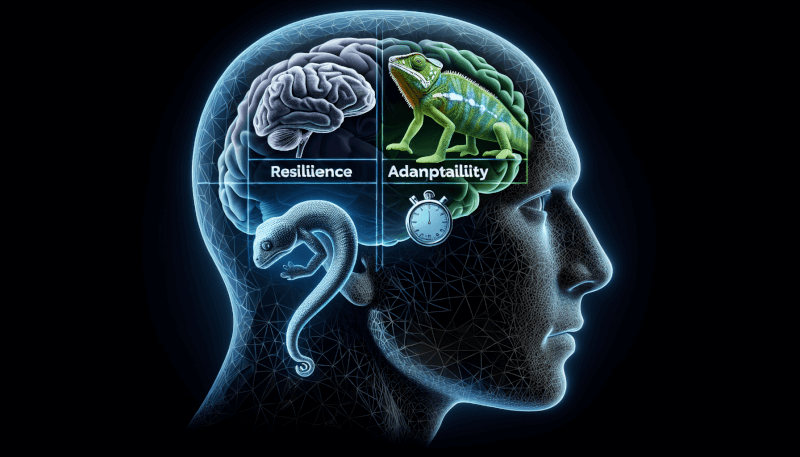Imagine you find yourself in a life-threatening situation, faced with the need to make split-second decisions. In such moments, your survival depends not only on your physical abilities but also on your mental strength. This article explores the fascinating world of survival psychology, shedding light on the crucial role it plays in helping you navigate through challenging situations and increasing your chances of getting out alive. With insights into the mindset and strategies of individuals who have faced near-death experiences, this piece offers a captivating glimpse into the incredible power of the human mind when faced with adversity.

Understanding Survival Psychology
The Importance of Mindset
When it comes to surviving in challenging situations, your mindset can make all the difference. Developing a positive and resilient mindset is crucial for overcoming adversity and increasing your chances of survival. Having a belief in your abilities and a determination to persevere will help you stay focused and motivated in even the toughest of circumstances. Remember, your mindset is a powerful tool that can help you stay calm, think clearly, and make rational decisions when faced with life-threatening situations.
Psychological Factors That Affect Survival
Survival is not only dependent on physical skills and resources, but also on psychological factors that play a significant role in determining your ability to survive. Factors such as mental toughness, adaptability, and problem-solving skills can greatly impact your survival rate. Being able to assess risks, cope with fear and panic, make quick decisions, and maintain resilience are crucial psychological factors that contribute to survival. By understanding and harnessing these psychological factors, you can enhance your chances of making it out alive.
Assessing the Situation
Remaining Calm and Rational
In any survival situation, it is essential to remain calm and rational. Panicking will only cloud your judgment and hinder your ability to make informed decisions. Take a deep breath, assess the situation objectively, and prioritize your actions. By staying calm, you can think clearly and effectively evaluate your surroundings, available resources, and potential risks. Panic is contagious and can spread to those around you, so practicing calmness not only benefits you but also helps maintain a sense of unity and collaboration within a group.
Evaluating the Risks
A critical aspect of survival is evaluating the risks involved in your situation. By understanding the potential hazards and threats, you can take appropriate measures to mitigate them. Assess the environment for immediate dangers, such as predators or hazardous terrain, and identify potential long-term risks, such as exposure to extreme weather conditions. Understanding the risks allows you to prioritize your actions and tailor your survival strategies accordingly.
Preparing for Survival
Building a Survival Kit
Being prepared and having a well-stocked survival kit is fundamental to increasing your chances of survival. Your survival kit should include essential items such as a first aid kit, fire starters, water purification tools, a multi-tool, a signaling device, and enough food and water for at least 72 hours. Customize your kit based on your environment and personal needs. Regularly assess and update your kit to ensure it remains relevant and functional.
Developing Essential Skills
In addition to having the right tools, acquiring and honing essential survival skills is crucial. Skills such as creating fire, building shelter, finding and purifying water, navigating without modern technology, and basic first aid can significantly increase your chances of survival. By working on these skills before you find yourself in a survival situation, you build confidence, familiarity, and competence, enabling you to adapt and respond effectively to any challenges that may arise.
Managing Fear and Panic
Recognizing and Acknowledging Fear
Fear is a natural response to survival situations, and acknowledging its presence is vital. It is essential to recognize that fear is not a sign of weakness but a normal reaction to stressful and life-threatening circumstances. Acknowledging your fear allows you to address it head-on rather than letting it control your decisions and actions. Remember that fear is a survival instinct, but it should not dictate your ability to think clearly and take appropriate measures to ensure your safety.
Control Techniques for Panic
Panic can be a dangerous and paralyzing emotion in a survival situation. Implementing control techniques can help prevent panic from taking over. One effective technique is deep breathing, which helps calm the body and mind. Another technique is grounding yourself by focusing on your surroundings and finding objects to stimulate your senses. Engaging in positive self-talk and reminding yourself of your capabilities and the steps you have taken to prepare for survival can also help regain control over panic. Practice these techniques before a survival situation arises to familiarize yourself with their effectiveness.

Finding and Creating Shelter
Identifying Safe Shelter Locations
Finding or creating a shelter is essential for protecting yourself from the elements and increasing your chances of survival. When selecting a shelter location, consider factors such as proximity to water sources, natural protection from wind and rainfall, and visibility for attracting rescue teams. Look for existing shelters, such as caves or natural formations, or adapt natural materials to create your shelter. Prioritize insulation to retain body heat and ensure your shelter is structurally stable to withstand any adverse weather conditions.
Utilizing Available Resources
In a survival situation, effectively utilizing available resources is key to meeting your shelter needs. Assess your surroundings for materials that can be used for shelter construction, such as branches, leaves, rocks, or even debris from your immediate environment. Use your survival skills to adapt and repurpose these resources to create a functional shelter. Additionally, consider any tools or equipment you have in your survival kit that can enhance your shelter-building efforts.
Obtaining Food and Water
Finding Water Sources
Securing a clean and reliable water source is a top priority in any survival situation. Knowing how to find and purify water is essential for your survival. Look for natural sources such as rivers, streams, or lakes, but be cautious of potential contaminants. Utilize methods such as boiling water, using water purification tablets, or constructing a basic water filter to ensure its safety for consumption. Stay hydrated and regularly replenish your water supply to avoid dehydration, which can significantly impact your physical and mental capabilities.
Hunting, Fishing, and Foraging
When it comes to obtaining food in a survival situation, hunting, fishing, and foraging become vital skills. Acquiring knowledge of local flora and fauna and understanding basic hunting and fishing techniques can help you procure sustenance. Focus on easily catchable game and edible plants to conserve energy and time. Remember to respect wildlife and only take what you need for survival. Additionally, having basic tools such as snares, fishing lines, and a knife in your survival kit can greatly aid in obtaining food.

Navigating and Signaling for Help
Navigational Techniques
Having the ability to navigate without relying on modern technology can be a life-saving skill. Learn basic navigational techniques such as using a compass, reading maps, understanding celestial navigation, and marking trails. Familiarize yourself with local landmarks and natural indicators, which can aid in orienting yourself and finding your way to safety. Use these techniques to create mental maps and track your movements, increasing your chances of finding civilization or rescue.
Creating Distress Signals
Signaling for help is crucial when you find yourself in a survival situation. Increase your chances of rescue by creating visible and effective distress signals. Brightly colored clothing or materials, reflective surfaces, and smoke from fires or improvised signaling devices can attract attention from potential rescuers. Utilize audible signals such as whistles or shouting in regular intervals to maximize their impact. Remember to stay vigilant and continuously signal for help, as rescue teams may be scanning the area from a distance.
Building and Maintaining Resilience
Adapting to Changing Circumstances
Survival situations are rarely static, and the ability to adapt to changing circumstances is vital. Be prepared to modify your plans and strategies based on available resources, weather conditions, or unforeseen challenges. Adaptability and flexibility will help you overcome obstacles and increase your resilience. Stay open-minded, think creatively, and be willing to reassess and adjust your approach as needed. By embracing change, you can better navigate through the uncertainties of survival.
Social Support and Collaboration
Humans are social beings, and maintaining social support can significantly impact your mental and emotional resilience in a survival situation. If you are with a group, foster a sense of unity and collaboration by assigning roles and responsibilities, maintaining open communication, and providing emotional support to one another. Sharing the burdens and challenges can lighten the load and enhance morale. Even if you are alone, seeking out human contact, whether it be through journaling, leaving messages, or actively searching for others, can provide a sense of connection and increase your resilience.

Coping with Isolation and Loneliness
Mental Strategies for Solitude
In a survival situation, isolation and loneliness can take a toll on your mental well-being. Developing mental strategies to cope with solitude is crucial. Practice mindfulness and meditation techniques to stay present and grounded in the moment. Engage in positive self-talk and focus on maintaining a strong mental state. Use visualization exercises to transport yourself to a different, more serene environment. Occupying your mind with tasks such as crafting tools or organizing your shelter can also help combat feelings of isolation.
Creating a Routine
Establishing a daily routine can provide structure and stability in an otherwise chaotic survival situation. Set goals, prioritize tasks, and allocate time for rest and self-care. Routines help create a sense of order and purpose, relieving stress and increasing your overall well-being. Include activities that bring you joy or provide a sense of accomplishment to maintain a positive mindset. While external circumstances may be unpredictable, having a stable routine can provide a sense of control and stability.
Recovering from Traumatic Events
Dealing with Post-Traumatic Stress
Surviving a traumatic event can have long-lasting psychological effects, and it is essential to recognize and address any symptoms of post-traumatic stress (PTS). Common symptoms include flashbacks, nightmares, anxiety, and avoidance behavior. Seek support from others who have experienced similar situations or professionals who specialize in trauma recovery. Engage in relaxation techniques, therapy, or group counseling to process your experiences and work through any emotional or psychological challenges. Remember, healing takes time, and it is important to prioritize your mental well-being during the recovery process.
Seeking Professional Help if Needed
If you find that your ability to cope with the aftermath of a traumatic event is significantly impacted or that your mental state is deteriorating, do not hesitate to seek professional help. Trained therapists, psychologists, or counselors can provide you with the tools and support needed to navigate through the challenges of recovery. Their expertise can help you regain a sense of stability, address any underlying issues, and develop healthy coping mechanisms. Remember, seeking help is a sign of strength and an important step towards healing.
Survival psychology is a multifaceted discipline that encompasses various psychological factors and strategies aimed at increasing your chances of survival. By understanding the importance of mindset, assessing the situation effectively, preparing with the right tools and skills, managing fear and panic, finding shelter, obtaining food and water, navigating and signaling for help, building resilience, coping with isolation and loneliness, and recovering from traumatic events, you can enhance your survival skills and increase your chances of getting out alive. Stay calm, stay focused, and remember, you are equipped with the strength and resilience needed to overcome any survival challenge.



